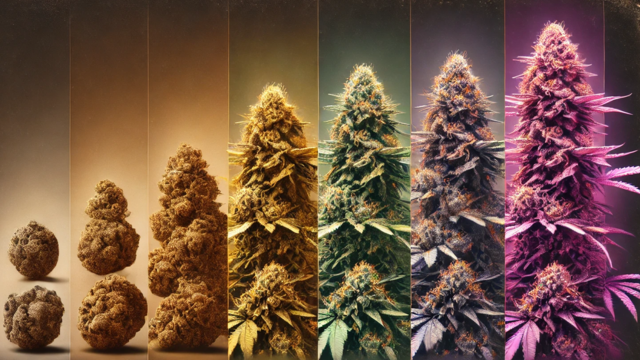Are you at least 21 years of age or hold a valid medical marijuana card?
Daily Specials
{{ special.title }}
{{ special.description }}
*{{ note }}EARTHMED BLOG

Strong Weed: This is Not Your Parents’ Pot

Cannabis culture has seen a remarkable evolution over the years. For those who remember the mellow buzz of the 60s and 70s, and even the higher quality sensi bud from the 80s and 90s, today's cannabis can feel like a whole new experience. The modern market is saturated with strong weed strains, boasting THC levels that would make the flower power generation's heads spin. Keep reading as we explore just how much cannabis has changed, what makes today's strong weed so potent, and why the adage "start low and go slow" is more relevant than ever.
A Blast from the Past: Cannabis in the 60s and 70s
Back in the day, cannabis was a different beast. The average THC content (the compound responsible for the psychoactive effects) in marijuana during the 1960s and 70s was around 1-3%. This meant users experienced a mild, gentle high that allowed for social interaction and creativity without overwhelming psychoactive effects. The strains available were limited, often sun-grown, with far less sophisticated methods compared to today's standards. Check out our previous post about Landrace strains for more information on cannabis strains popular in the 1960s and 1970s.
The Evolution Continues: Cannabis in the 80s and 90s
The 1980s and 90s marked a significant period of transition in cannabis culture and potency. During this time, the average THC content started to climb, with many strains reaching 5-10%. This increase was due to a growing interest in selective breeding and improved cultivation techniques. The cannabis of this era was stronger than its predecessors but still paled in comparison to today's potent pot.
- Emergence of Hydroponics: The 80s and 90s saw the rise of hydroponic growing methods, allowing for more controlled and efficient cultivation. This innovation led to higher quality and more potent cannabis.
- Introduction of Sinsemilla: Sinsemilla, or seedless cannabis, became popular in this era. By preventing pollination, growers could produce more potent buds with higher THC concentrations.
- Popular Strains: Strains like Skunk #1 and Northern Lights gained popularity for their increased potency and distinct effects. These strains laid the groundwork for developing even more potent weed in the following decades.
The Rise of Strong Weed Strains
Fast forward to today, and the cannabis landscape is almost unrecognizable. Advances in cultivation techniques, selective breeding, and technology have resulted in strains with THC levels averaging between 15-30%, and some even pushing the boundaries at over 30%. This dramatic increase in potency can be attributed to several factors:
- Selective Breeding: Modern growers meticulously pheno hunt to breed plants to enhance desired traits, such as higher THC levels, better flavors, and specific effects.
- Advanced Cultivation Techniques: Indoor growing, hydroponics, and controlled environments allow for optimal growth conditions, maximizing the potency and quality of the cannabis.
- Genetic Manipulation: Crossbreeding different strains has resulted in new, powerful hybrids that combine the best attributes of various plants.
Today's Potent Pot: A Closer Look
Some of the most potent strains today are famous not only for their high THC content but also for their distinctive effects and flavors. Here are a few notable mentions:
- Girl Scout Cookies (GSC): This hybrid strain offers a euphoric high and is known for its sweet and earthy aroma. With THC levels often reaching 28%, it's a favorite among seasoned users.
- Gorilla Glue #4: Aptly named for its sticky resin, this strain can have THC levels up to 30%. It's renowned for its powerful body high and is often used to alleviate pain and stress.
- OG Kush: A classic that has stood the test of time, OG Kush typically boasts THC levels of around 20-25%. It provides a balanced high, perfect for both relaxation and socializing.
These strains, among many others, exemplify the incredible potency of cannabis today. However, this newfound strength comes with a caveat.
Start Low and Go Slow: A Wise Rule for Modern Tokers
For those who grew up with the gentler highs of yesteryears, diving into today's potent pot can be a jarring experience. The "start low and go slow" mantra is essential for anyone trying strong weed strains for the first time or after a long break. Here's why:
- Avoid Overwhelming Effects: High THC levels can lead to intense psychoactive experiences, including anxiety and paranoia, especially for those with lower tolerance.
- Control the High: Starting with a small amount allows users to gauge the effects and avoid overconsumption, leading to a more enjoyable and manageable experience.
- Health and Safety: Gradually increasing the dose reduces the risk of adverse reactions and helps users find their optimal level of consumption.
The evolution of cannabis from the 60s and 70s to today's potent pot is a testament to the advancements in cultivation and breeding techniques. While modern strong weed strains offer unparalleled experiences, they also require a cautious approach, especially for those new to these high-THC varieties. By adhering to the "start low and go slow" rule, both seasoned and new users can enjoy the benefits of these powerful strains safely and responsibly.
In this rapidly evolving cannabis landscape, staying informed and mindful of one's consumption is key. So, whether you're reminiscing about the mellow highs of the past or exploring the potent pot of today, remember to take it slow and savor the journey. Either way, hit me up on social media, and let’s spark up a conversation about it.
{{ locations[0].name }}
{{ locations[0].address }}{{ locations[0].city }}, {{ locations[0].state }} {{ locations[0].zip }}
{{ locations[0].phone }}
Hours
Sun: {{ locations[0].hours_recreational.Sunday }}Mon: {{ locations[0].hours_recreational.Monday }}
Tue: {{ locations[0].hours_recreational.Tuesday }}
Wed: {{ locations[0].hours_recreational.Wednesday }}
Thu: {{ locations[0].hours_recreational.Thursday }}
Fri: {{ locations[0].hours_recreational.Friday }}
Sat: {{ locations[0].hours_recreational.Saturday }}
{{ locations[1].name }}
{{ locations[1].address }}{{ locations[1].city }}, {{ locations[1].state }} {{ locations[1].zip }}
{{ locations[1].phone }}
Hours
Sun: {{ locations[1].hours_recreational.Sunday }}Mon: {{ locations[1].hours_recreational.Monday }}
Tue: {{ locations[1].hours_recreational.Tuesday }}
Wed: {{ locations[1].hours_recreational.Wednesday }}
Thu: {{ locations[1].hours_recreational.Thursday }}
Fri: {{ locations[1].hours_recreational.Friday }}
Sat: {{ locations[1].hours_recreational.Saturday }}






